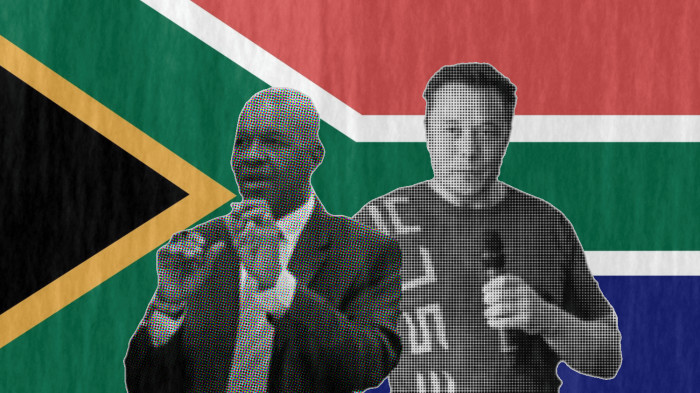Unlock the White House Watch newsletter for free
Your guide to what the 2024 US election means for Washington and the world
The Financial Times, February 2 2025:
Elon Musk has vowed to unilaterally cancel hundreds of millions of dollars’ worth of government grants after apparently gaining access to review the US Treasury’s vast payments system, a move that prompted the sudden resignation of one of the department’s most senior officials…
The threat came after Musk appeared to confirm on Saturday that Doge had access to the Treasury system, which disburses trillions of dollars each year, including social security payments.
In 2014, Jacob Zuma returned as the president of South Africa after the African National Congress swept national elections. Jacob Zuma had many friends. They included Tom Moyane. Zuma appointed Moyane to run the South African revenue service, Sars.
At the time, Sars was a world-class tax collection agency. With help from Bain & Co, the consultant — which has since apologised for its role — Moyane purged the institution.
It took years to investigate and repair the damage, which became part of the country’s ‘state capture’ saga, until Zuma resigned in 2018 and Moyane was removed from office.
State capture is a grandly named concept. But its everyday reality was chaos as much as conspiracy: IT ‘reforms’, data breaches, and odd ‘advisers’ appearing out of the woodwork. It was underestimated in this form.
From the Final Report of the Nugent Commission of Inquiry into Tax Administration and Governance by the SARS, December 2018:
One heading was ‘KEEP THE BALL ROLLING”, under which one recommendation was ‘Launch IT diagnostic’. IT capability had been built up in SARS over a decade, and Bain had no knowledge of what it comprised, yet it proposed that a diagnostic evaluation should be launched, which is indeed what occurred soon after Mr Moyane took office…
A decision was taken that the organisational structure of SARS would be changed even before Bain and Mr Moyane had spoken to anyone at SARS. Bain knew nothing about SARS other than what was available from public sources. From information furnished to me by Bain it had no more than peripheral experience of a tax collection agency…
This was not a strategy for succession in public service. Public servants succeed one another in service of a common goal, which is the welfare of the state. They have no need to neutralise other public servants. This was a strategy more appropriate to a corporate takeover . . . It had all to do with seizing control of SARS.
… Every managerial employee who gave evidence before us said he or she was either not consulted in the course of the exercise undertaken by Bain, or was consulted only perfunctorily, often by junior employees of Bain. Many were puzzled at why it was thought necessary to ‘fix what was not broken’.
WIRED, February 2 2025:
WIRED has identified six young men — all apparently between the ages of 19 and 24, according to public databases, their online presences, and other records — who have little to no government experience and are now playing critical roles in Musk’s so-called Department of Government Efficiency (DOGE) project…
Already, Musk’s lackeys — including more senior staff from xAI, Tesla, and the Boring Company — have taken control of the Office of Personnel Management (OPM) and General Services Administration (GSA), and have gained access to the Treasury Department’s payment system, potentially allowing him access to a vast range of sensitive information about tens of millions of citizens, businesses, and more.
State capture afflicted many other South African institutions. Zuma had many other friends. Above all, there were the Guptas, a trio of Indian-born brothers who controlled a mining-to-media empire that stood to benefit from state contracts.
When Zuma abruptly sacked Nhlanhla Nene, an experienced finance minister, in 2015 and appointed an unknown ANC backbencher, Des Van Rooyen, with allies of the Guptas (including one Mr Bobat) among his advisers, South Africa’s National Treasury appeared to be next.
From the Final Reports of South Africa’s Judicial Commission of Inquiry into State Capture, Part IV, Volume One, April 2022:
Fuzile [a senior National Treasury civil servant at the time] said that Mr Bobat felt such a sense of authority and empowerment that he could issue instructions to anyone without first checking with the person (the Minister-designate) on whose behalf he purported to act. Mr Fuzile said that Mr Bobat gave him an impression of being a law unto himself…
President Zuma was captured by the Guptas and they could get him to do whatever they wanted in order to advance their business interests and to advance state capture…
Our National Treasury nearly fell into the wrong hands, particularly during the difficult four days in December 2015 following Minister Nene’s dismissal and Mr Des Van Rooyen’s appointment as Minister of Finance. Mr Des Van Rooyen, Mr Bobat and Mr Whitley were already inside the country’s National Treasury. Mr Bobet and Mr Whitley had begun to send National Treasury’s confidential documents to the Guptas and their associates outside of National Treasury. It is almost a miracle that the National Treasury was saved from the tentacles of the Guptas! l shudder to think what would have happened to this country if President Zuma was not forced to move Des Van Rooyen and his advisers out of the National Treasury and if Van Rooyen and his advisers had been allowed to continue in the National Treasury.
Zuma, Moyane, the Guptas and other alleged key players in South Africa’s state capture have always denied wrongdoing.
In any case, thanks to inquiries like the above, South Africans and the South African diaspora have been able to learn from one of the country’s darkest post-apartheid chapters.
Most of them, anyway.
Related link:
— “Seize the state, seize the day” – World Bank (2000)
Source link









